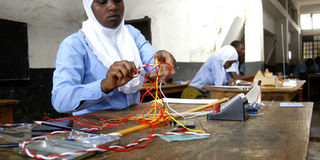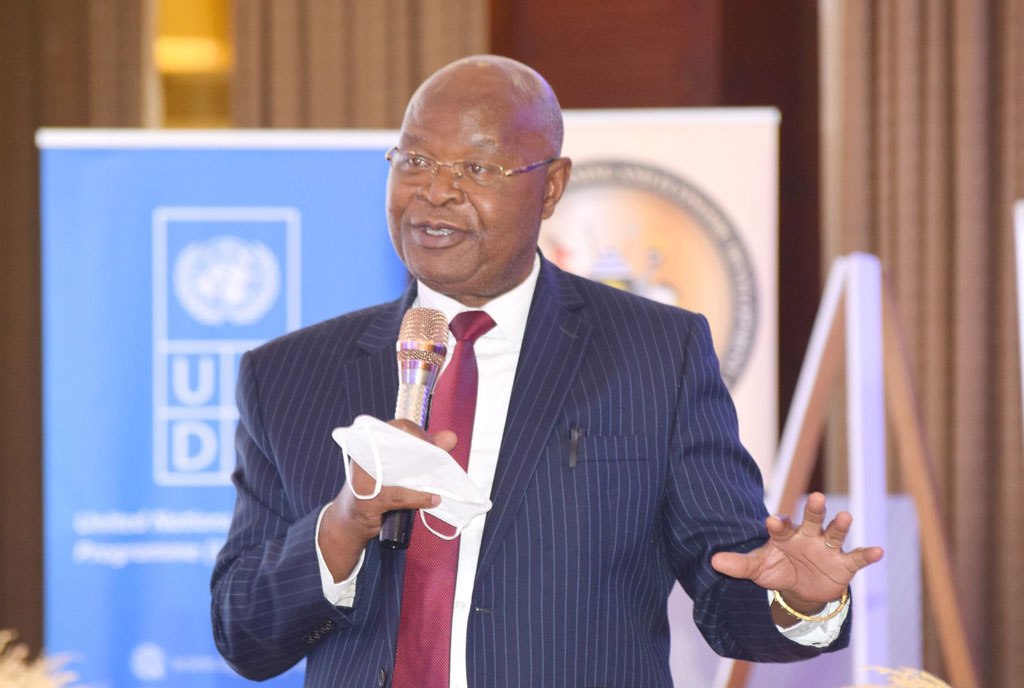Few books, teachers mar start of new curriculum

Practical exam. Students of Kakungulu Memorial Secondary School in Kibuli, Kampala, carry out a Physics practical during Uneb examinations last year. School administrators have appealed to government not to rush the implementation of the new curriculum. Photo BY Abubaker Lubowa
What you need to know:
Impending challenge. Head teachers in many schools say lack of teaching material and few trained teachers are the main hindrances in implementing the new curriculum
As government rolls out the new lower secondary curriculum countrywide, school administrators have appealed to the government not to rush its implementation, if it is to realise its intended purpose.
In a mini-survey conducted by Daily Monitor on schools implementing the curriculum, teachers and school heads observed that there is need for enough instructional materials to be shared to all schools. They also noted that lack of enough teachers to handle the new subjects as another underlying challenge.
Despite resistance from parliamentarians and otherstake holders, government started implementing the curriculum on Monday, the day Senior One entrants reported for First Term.
Under the new curriculum, schools are required to teach 12 subjects at Senior One and Senior Two, of which 11 are compulsory while one is from an elective menu (optional).
Students at Senior three and Senior Four will exit with a minimum of eight or a maximum of nine subjects, seven being compulsory.
The teachers will be required to compile the learners’ achievements under the formative assessment in the four-year cycle, find an average score and submit it to the Uganda National Examinations Board (Uneb) to contribute at least 20 per cent in the final national examinations grading.
Chinese language has been added to the menu of foreign languages while Kiswahili, Physical Education and Entrepreneurship will be compulsory for all students in Senior One and Two.
The survey noted that ill-preparation is hampering the implementation of the new curriculum.
In Kalungu District, many schools visited admitted they lacked tools and materials for teaching.
At Crested High School-Mukoko, Mr Paul Mukoobi, the head teacher said the school is yet to purchase learning materials. “Since my school was withdrawn from Universal Secondary Education scheme, it is becoming difficult to buy those materials,” he said.
Distributing material
Last week, Ms Grace Baguma, the executive director at National Curriculum Development Centre (NCDC), revealed that they had prepared to distribute materials to about 4,000 secondary schools across the country only to discover that there were more than 4,000 others.
Ms Baguma advised school heads who will not get the text books to download the material from the NCDC website as they make arrangements to distribute more hard copies.
Mr Godfrey Tumwijukye, the director of studies at St Michael High School in Kamwenge District, said government should halt the implementation of the curriculum until next year.
“I was among the teachers who were trained at Nyakasura School, but what I discovered is that some teachers were not ready for the training,” Mr Tumwijukye said.
At St Noa Mawaggali SS in Buikwe District, the head teacher, Mr Leonard Ssali, said of the 23 teachers handling students in lower secondary level, only five teachers received training.
“It [curriculum] is very interesting, we have received Chapter One material that includes introduction to the syllabus and teachers are trying their best to acquaint themselves with it, those who got attained are training others,” Mr Ssali said.
Mr Lawrence Sekirabi, the head teacher of Mount Zion SS in Mubende District, said the school is yet to receive instructional materials.
Mr Sekirabi reveals that only four of the 15 teachers at the school received training on the new curriculum.
“Currently, we have 200 students in Senior One. So, it is practically impossible for all these children to receive the attention they deserve,” he said.
In Gulu District, the delayed arrival and failed access to the learning materials has been identified as a big hindrance to implementation.
Mr Innocent Anecho, the head teacher of St John Paul II College, said: “The training given to the teachers was insufficient and some do not have adequate knowledge to deliver the curriculum. We are now being forced to use our own resources to train and equip others.”
Several schools like Gulu Central High School, Pope Francis High School, Gulu SS, Sacred Heart, and Trinity College, among others were experiencing the same challenge of delayed delivery of learning materials.
Poor preparation
In Bugisu Sub-region, the situation is not different. Many teachers expressed disappointment over government’s unpreparedness in implementing the curriculum.
Mr Aggrey Othieno, the deputy director of studies at Mbale High School, said many teachers lack the skills and knowledge required to handle the curriculum.
“I don’t know why the Education ministry is rushing to implement it [curriculum] yet the teachers are ill-equipped,” he said.
Ms Alice Nasiyo, the assistant director of studies at Nkoma SS, said: “Some of our teachers were not trained, it is becoming hard for us to teach using this new curriculum,” she said.
Efforts to talk to the State Minister for High Education, Mr John Chrysestom Muyingo, were futile by press time.
Ms Judith Nabakooba, the Ministry of ICT and National Guidance, said the new curriculum was rolled out after 10 years of “deep preparations and consultations.” She said some concerns like training of teachers, printing and distributing new learning materials will be addressed as they progress.
Ms Nabakooba said 20,000 trainers have so far been posted to various schools to train the teachers.
Ms Lucia Alinda, the director of St Lucia High school, Fort Portal, said they have so far bought 14 textbooks for the new curriculum. “We have printed books in the school and we selected the project of agriculture because we have 20 acres of land,” Ms Alinda said.
In Masaka District, the director of studies at Blessed Sacrament SS-Kimaanya, Mr Robert Wozemba, said they are ready to implement the new curriculum. “Of the books we are supposed to have, government has only sent us one. We have also secured only one book titled Systematic Frame Work yet government recommends that at least each school gets 12 to 15 books,” he said.
Mr Wozemba said they have failed to get a Chinese teacher despite putting advertisements on radio.
At Masaka SS, the director of studies, Mr Ahmed Ssemwanga, said they have already adopted the curriculum and teachers would undergo more training.
Mr John Paul Ochan, the director of Allied Teachers’ SS-Buikwe, said their teachers have been trained and Senior One students are yet to start lessons.
Ms Hilda Namutosi, the head teacher of MM College Wairaka in Jinja District, said the school has received few textbooks, but added that most of the materials are got from the NCDC website.
In Bunyoro Sub-region, some teachers said they will not implement the new curriculum if government excludes Bunyoro history on the syllabus.
In Teso Sub-region, a section of school administrators, said teachers would take some time to understand the new curriculum.
The head teacher of Teso College Aloet, Mr Julius Opasso, said they are happy with the curriculum because it provides students with opportunity to be creative and innovative.
“Students are meant to have field work and produce field reports during holidays,” he said.
At Global High School, Mbarara Town, the head teacher, Mr Laban Kinawa, said: “Much as the new curriculum emphasises skills, we don’t have some facilities. You cannot teach carpentry without a workshop.”
In Tororo District, most schools were orientating students on the new curriculum while others were using their few trained teachers to train others.
Ms Hellen Wataba, the head teacher of Tororo Girls School, acknowledged the challenge associated with adjusting to new changes. “For us, we are trying to implement the curriculum by supporting one,” she said.
Compiled by Al-Mahdi Ssenkabirwa, Alex Ashaba, Josephine Nnabbaale, Gertude Mutyaba, Polycap Kalokwera, Rajab Mukombozi, Muzafaru Nsubuga, Oliver Mukaaya, Sadat Mbogo, Ismail Bategeka, Simon Naulele & Joseph Omollo.
Integration, teaching
• Other issues such as climate change, patriotism, human rights, peace, gender, and HIV/Aids, have been integrated into various subjects.
• Classroom teaching has reduced to five hours a day.
• Lessons have to start at 8:30am and end at 2:50pm to allow learners engage in research, project work, clubs, games and sports.



